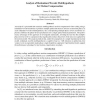Free Online Productivity Tools
i2Speak
i2Symbol
i2OCR
iTex2Img
iWeb2Print
iWeb2Shot
i2Type
iPdf2Split
iPdf2Merge
i2Bopomofo
i2Arabic
i2Style
i2Image
i2PDF
iLatex2Rtf
Sci2ools
114
click to vote
DCC
2006
IEEE
2006
IEEE
Analysis of Redundant-Wavelet Multihypothesis for Motion Compensation
An analysis is presented that examines multihypothesis motion-compensated video coding using a redundant wavelet transform to produce multiple predictions that are diverse in transform phase. In such redundant-wavelet multihypothesis, the corresponding multiple-phase inverse transform implicitly combines the phase-diverse predictions into a single spatial-domain prediction. The performance advantage of this approach is investigated analytically, invoking the fact that the multiplephase inverse involves a projection that significantly reduces the power of the noise not captured by the motion model. The analysis predicts that, under the assumption of a simple translational motion model, redundant-wavelet multihypothesis is capable of up to a 7-dB reduction in prediction-error variance over an equivalent single-phase, single-hypothesis approach. Experimental results support the performance advantage for real motion-compensation residuals.
Computer Graphics | DCC 2006 | Multiple-phase Inverse Transform | Redundant Wavelet Transform | Translational Motion Model |
Related Content
| Added | 25 Dec 2009 |
| Updated | 25 Dec 2009 |
| Type | Conference |
| Year | 2006 |
| Where | DCC |
| Authors | James E. Fowler |
Comments (0)

